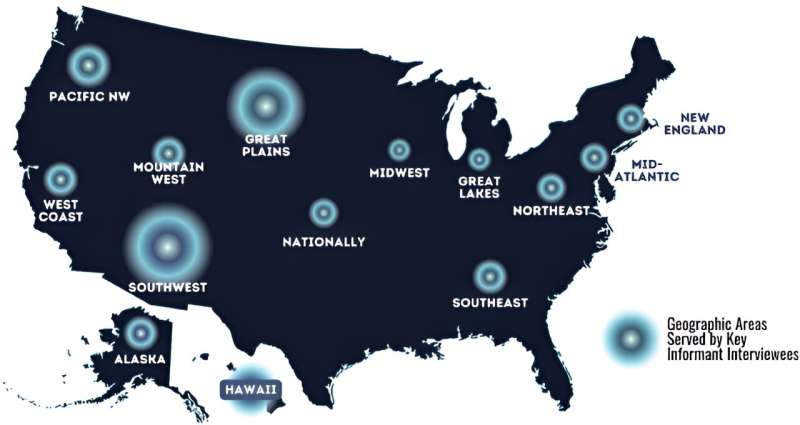Understanding food insecurity and its effects on the risk of gestational diabetes

A visual representation of the areas of the US where key experts work. Credit: Journal of Nutrition Education and Behavior (2024). DOI: 10.1016/j.jneb.2024.06.004
Food insecurity, defined as the lack of consistent access to enough food for an active, healthy life, is exacerbated in ethnic communities by anti-racism, including policies that undermine traditional food practices and access. A recent qualitative study on Journal of Nutrition Education and Behavior examines the relationship between food insecurity and risk of gestational diabetes among young American Indian and Alaska Native women. This study highlights how targeted risk reduction strategies can significantly improve diabetes health outcomes in this population, which is disproportionately affected by health disparities.
Lead author Sarah Stotz, Ph.D., RDN, CDCES, Department of Food Science and Nutrition, Colorado State University, explains, “For many Native Americans, the lasting effects of colonialism, removal force on traditional lands, residential schools, and food programs past and present have influenced the way Native people eat and why those eating habits are passed down the generations.”
The research, conducted between September 2022 and February 2023, recruited experts in American Indian and Alaska Native food, nutrition, food systems, reproductive health, adolescent health, and health. women’s beauty to discuss the relationship between food insecurity and the risk of diabetes during pregnancy. Using a formal structured guide, interviews and focus groups were recorded via teleconference or in-person groups (eg, Zoom). The evaluator’s guide was developed by five expert qualitative researchers with expertise in food systems, reproductive health, and Indigenous communities, including three of them who are Indigenous.
Qualitative research revealed three important themes: 1) eating and nutrition patterns are shaped by different food choices and driven by the lingering effects of colonialism; 2) young people are influenced by what their peers eat and the food environment, including outside the home; and 3) the methods used to understand family food insecurity and nutritional practices in a randomized controlled trial (eg, a parent study) may have been limited.
Future interventions will benefit from using strengths-based, culturally-informed, trauma-informed, multidisciplinary coping strategies and healthy eating and eating habits. nutrition among Indigenous youth, emphasizing the integration of peer-based resources and family-based strategies into diabetes risk reduction programs. . This community-based approach should include culture-based assessments and risk models of household food insecurity and promote collaborative relationships between health care, food stores and public health departments. Such efforts will help create healthy environments and resources that focus on Indigenous people, with the goal of achieving better health for Indigenous women and reducing diabetes disparities.
Dr. Stotz says, “Within public health frameworks, it is important to address the upstream factors and the systems that create the downstream factors (eg, individual behavior). It is important to emphasize that communities many already know power-based solutions that would improve overall health for their people, and initiatives and programs should create community-generated ideas and solutions.
Additional information:
Sarah A. Stotz et al, The Relationship Between Food Insecurity and Healthy Eating Behaviors for Gestational Diabetes Risk Reduction Among American Indian and Alaska Native Teens and Young Women Adults: Eligibility Test, Journal of Nutrition Education and Behavior (2024). DOI: 10.1016/j.jneb.2024.06.004
Excerpt: Understanding food insecurity and its effects on the risk of gestational diabetes (2024, September 5) retrieved on September 6, 2024 from https://medicalxpress.com/news/2024-09-food-insecurity -effects-gestational-diabetes.html
This document is subject to copyright. Except for any legitimate activity for the purpose of private study or research, no part may be reproduced without written permission. Content is provided for informational purposes only.
#Understanding #food #insecurity #effects #risk #gestational #diabetes